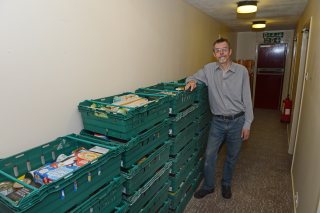‘Alarming’ increase in number of children using foodbank

The coronavirus pandemic has caused an “alarming” increase in the number of children relying on support from the Lerwick foodbank.
April saw a 400 per cent spike in demand for food parcels for youngsters compared with the same month last year.
The increase from 13 to 53 has been put down to children staying at home during the lockdown, putting a strain on family budgets at exactly the same time that many parents are unable to go out to work.
Overall, the foodbank saw a 40 per cent increase in demand.
The Scottish government has announced £1.6 million in support to help tackle food insecurity – a move welcomed by the foodbank co-ordinator David Grieve.
However, he said the Covid-19 crisis was having a dramatic impact on demand for services, particularly for youngsters.
That was something Mr Grieve has described as “alarming”.
“The number of children who were receiving help in April this year was 400 per cent higher than in April 2019,” he said.

“Much of this increase in demand is likely to be because children are at home all day and every day, putting more demands on family budgets for food, electricity, heating and more.
“Similarly parents are probably not working either and so are also at home adding to the financial strain.”
Overall, the national picture has seen demand for foodbank stocks rise by 89 per cent in April, with a 107 per cent rise for children.
Mr Grieve said: “The foodbank is coping well with the rise in demand. Food stocks are good, helped by food coming in from both the Scottish government through the council hub and from the national support effort organised by Tesco.
“These two sources have really helped to boost our normal regular food donations coming in through local shops.
“Where necessary we have also been able to buy in additional food and toiletries using the funds which we have received from many different sources.”
SIC education and families committee chairman George Smith said the figures were “concerning” and urged anyone who thought they may be entitled to free school meals to make the necessary enquiries.
Mr Smith said: “It’s obviously concerning and disappointing that there is an increased demand on the foodbank particularly from families.

“There are probably people accessing the foodbank that have never had to do so in the past.
“I would encourage anybody entitled to free school meals to be making sure they make that application
“We are paying £3 a day, and that goes into the bank account.”
Mr Smith’s comments came as the Scottish government highlighted additional support it was providing from its £70 million Food Fund.
FareShare, a national network of charitable food distributors, has distributed over 1,440 tonnes of food – the equivalent of almost 3.5 million meals – since 23rd March, supported by £500,000 of Scottish government funding.
Now, an additional £1.6 million of funding will help FareShare purchase more food for local authorities, community-run initiatives and frontline charities across Scotland.
Mr Grieve said: “This is very welcome news as Shetland has been benefiting from the government’s support following the announcement of the initial £500,000 funding and I fully expect that the need for this support will remain for many months to come, even when the pandemic is fully controlled.
“The Trussell Trust announced today that nationally there has been an 89 per cent increase in demand for support during April compared with 2019 and more alarmingly there was a 107 per cent rise in support for children.”
Scottish communities minister Aileen Campbell said: “At this difficult time, it is more important than ever that we tackle food insecurity by supporting the work of community food distribution groups across the country who are best placed to ensure vital supplies reach those who need it most.
“By working in partnership with FareShare and their partners in communities across Scotland, this extra funding will help frontline charities and community food groups provide support to even more people in need.”








John Thomas
Even before the Coronavirus crisis, 22% of the UK population lived in poverty.
https://www.jrf.org.uk/report/uk-poverty-2019-20
We were told there was no magic money tree. Services for the most vulnerable were slashed. Yet we could afford to cut tax for the highest earners in 2013. Food banks have become normalised. This is not normal. This is not inevitable. We could choose as a society to look after our most vulnerable so they are not reduced to this. We could easily afford to. Once this is over, we need to do better. I don’t know how – but I know a man who does… Ian over to you?